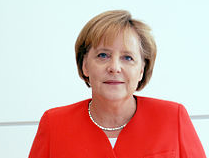Merkel Partners Call For Greece Euro Exit
By EurActiv
(EurActiv) — Angela Merkel’s coalition partners are lining up to demand a Greek exit from the euro, mounting pressure on the German chancellor and fanning market fears that Greece could shortly leave the single currency bloc.
Patrick Döring, general-secretary of Angela Merkel’s junior coalition partners the Free Democrats (FDP), told the regional Passauer Neue Presse newspaper that Greece could recover and regain competitiveness more quickly outside the eurozone.

“If Greece was no longer a part of the eurozone it could create trust on markets”, he said in remarks published Tuesday (24 July).
He is the latest of a number of top-ranking members of the two smaller parties in Merkel’s coalition to call for an exit for the benefit of Greece and to prevent contagion, mindful of the rising cost to Germany of bailing out weaker eurozone states.
Rating agency Moody’s acknowledged that burden on Monday, dropping its outlook on German debt from stable to negative.
FDP leader Philipp Rösler, who is also Germany’s vice chancellor and economy minister, told television over the weekend a Greek exit was no longer a taboo for experts, or his party. “It has lost its fear factor,” he said.
He told broadcaster ARD that he was more than skeptical on whether Greece could meet the terms of its aid package. Faced with insolvency Greeks would decide themselves to leave the single currency, he said. Merkel has herself said that asking Greece to exit the eurozone would be “catastrophic” and a “huge political mistake”, calling on leaders to support the country as it implements austerity measures.
Troika meeting
Inspectors from the international ‘troika’ – the European Commission, European Central Bank and International Monetary Fund – were headed to Athens on Tuesday to discuss some €11.7 billion of spending cuts Greece needs to make in 2013 and 2014.
The troika will be judging whether Athens has implemented enough reforms to merit further payments, which so far have totaled some €240 billion.
Despite asking for another two years to implement economic reforms, Prime Minister Antonis Samaras said on Tuesday that he would push ahead with deep spending cuts, saying that his country must “quickly catch up” with delays in carrying out the conditions of the second, €130 billion, bailout.
The country’s five-year recession may worsen to deeper than 7% this year, Samaras said earlier on Tuesday, further complicating its efforts to hit the tough budget targets.
Loud voice in eurozone policy
The FDP slumped dramatically in opinion polls over the last year but recently has seen some recovery to around 4-5% of the vote. It still has 93 seats in the 620-seat Bundestag, or lower parliamentary house, giving it a significant voice on eurozone policy.
Alexander Dobrindt, general-secretary of the more influential Christian Social Union (CSU) – the Bavaria-based sister party of Merkel’s Christian Democrats (CDU) – on Monday urged Greece to start paying half of its pensions and state salaries in drachmas as part of a gradual exit.
Rösler’s comments were condemned as reckless by European Parliament FDP lawmaker Jorgo Chatzimarkakis, who is a German of Greek descent.
Rösler’s “wording was wrong-headed, he gave the thumbs-down before the troika even arrived in Athens,” he told Deutschlandfunk radio in an interview.
“Germany is highly dependent on developments with the euro and we need it as a stable currency anchor. When we send markets on a downward spiral with comments such as these it is reckless,” he said.
Germany’s finance ministry on Monday urged people to wait for the results of the troika mission, a stance echoed by Austrian Finance Minister Maria Fekter.
